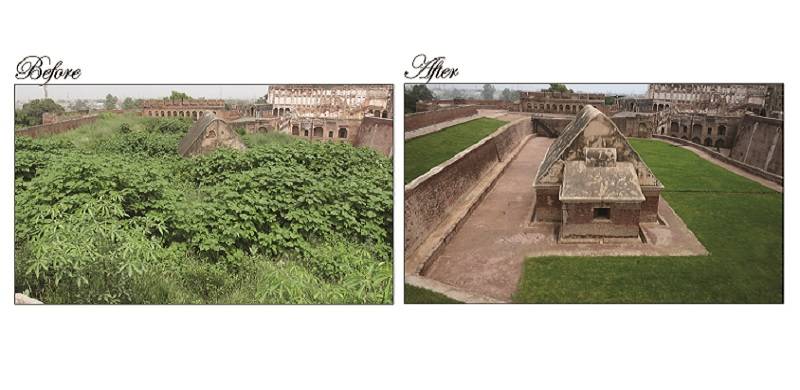
After ages of neglect, the structure of the British-era arsenal depot was revealed by the Walled City of Lahore Authority (WCLA) teams and now it stands majestically restored.
The Barood Khana (arsenal) of Lahore Fort, since the 1947 Partition, was hidden and got buried under loads of debris, wild plants and waste. Anyone passing by the British-era bridge could not imagine such a structure there. One could only see waist-high shrubs and debris.
The building was abandoned and was suffering serious neglect-related damage when the Walled City of Lahore Authority started removing almost thousands of cubic feet of debris from it and finally the wonder was revealed. While this waste, debris and wild vegetation were being removed, two British-era cannons were also found there.
Aside from structural damage, the Barood Khana building also had bulging plaster, missing or dismantled brick masonry, missing cornices, damaged wooden doors and ventilators, blackish surfaces and graffiti inside the building. The doors and windows were ridden with termites and woodworms.
This building was built in 1857 during the British colonial era for the purpose of storing gunpowder. According to historic maps of Lahore Fort, it was found that there was a garden with arcades around it before the construction of the Barood Khana there. The structure was the part of Alamgiri Gate and Musamam Darwaza of Lahore Fort and, later during the British colonial era, a road was constructed to connect the Hathi Gate with the Diwan-e-Aam. This is the same road that we use today to enter in the Lahore Fort.
The Barood Khana, being close to the vicinity of Alamgiri Gate and Musamam Darwaza, was an addition by the British. It was obvious that some parts from the pre-colonial era must have been demolished in order to build it. This fact was revealed during the excavation of the area while conserving the Barood Khana.
Interestingly, among the structures unearthed during conservation of the Barood Khana were some that people were tempted to see as tunnels.
Now, tunnels have always been fascinating when it comes to the Lahore Fort. People still think that there are tunnels leading to Delhi or the Shalimar Bagh. This can only be investigated once there is a proper mechanism for excavations.
Anyhow, the structures found underground were chambers which either connect with the Alamgiri Gate and go up to Shah Burj Gate or connect with the Musamam Gate. The studies are still going on by the conservation teams of the Walled City of Lahore Authority.
This area is now open for the public and newlyweds are seen getting their photo-shoots done there.
Let us consider another marvel revealed inside the Lahore Fort, which is the Akbar-era Shahi Hammam.
While the teams were cleaning the Akbari Gate area, there was a garage built by the Archaeology Department at some time in the past. The garage was dilapidated and thus it was decided to remove it. In that process, some structures started revealing themselves and as the teams went further into excavation, they found an entire Hammam structure underground, which was well intact. There were separate chambers and Akbar-era architecture was clearly reflected in the style of building.
This Hammam is also being conserved by the Walled City of Lahore Authority and very soon it will be opened for the public.
We have not yet come to the end of new discoveries at the Lahore Fort. There are new revelations with every excavation carried out by the authority. The Lahore Fort, without doubt, is a mysterious place and requires a lot of further study.
